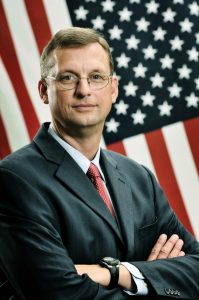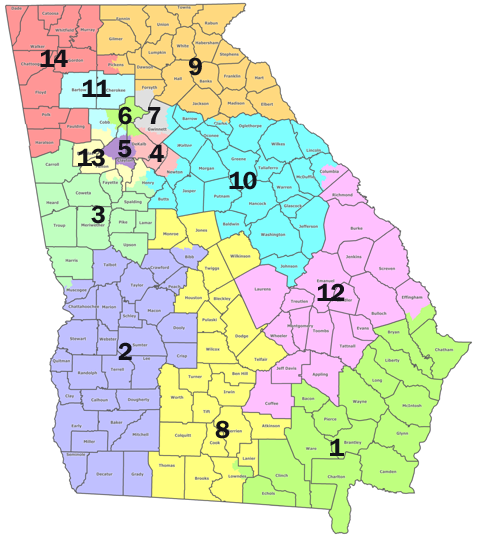Q&A with GA-9th District Rep. Doug Collins

By: Shalin Jyotishi
As the heated Georgia gubernatorial and senatorial races rumble on, many democrats are hoping to see Georgia “turn blue.” Polls have revealed both campaigns to be toss ups. Hopeful liberal Georgians have cited demographic changes in Georgia as enhancing their chances of taking the governor’s office and one of two senate seats.
However, Republicans aren’t keen on giving up Georgia to Democrats. Despite Mitt Romney winning Georgia by only 7.8 percentage points, down from the 16.6 points during the 2004 Bush-Gore election, Georgia is still a conservative, red state. Georgia is home to some of the most conservative congressman in the U.S. House of Representatives, including Paul Broun (GA-10) and Phil Gingrey (GA-11). The Peach State is also home to the most far-right member of the House, Lynn Westmoreland (GA-3).
Further, Georgia is also home to the most conservative district east of the Mississippi, the 9th district. Spanning from the northern edge of Athens, Ga to all of Northeast Georgia, District 9 is a solid red bastion.
In a previous GPR piece, I interviewed physicist, teacher and social organizer, David Vogel, who is running on District 9’s Democratic ticket. Vogel’s platform centers on inequality and “evidence-based policy.” To learn more about the other side of this interesting race, I sat down with army chaplain, attorney, and former Georgia state representative: GA-9th District incumbent Doug Collins.

GPR: What makes you qualified to represent Georgia’s 9th District in the U.S. House of Representatives?
I think my current service as congressman and my record here in Washington, DC shows that I’m a conservative that represents the 9th district very well considering the 9th being the most conservative district east of the Mississippi. My background in state legislature, my service in Iraq, the fact that I’ve owned a small business and that I was in the Air Force as a chaplain provide me with a good foundation. I think all these things will help me up in DC to get our economy going, get our government out of the way.
GPR: You’re on the Committee on Foreign Affairs. You’ve also served in the Air Force Reserve since 2002. What do you think is the most pressing international issue facing America and what you would like to do about it if you’re re-elected in November?
I think the biggest thing we face overseas is the continuing threat of terrorism that is still present around the world and is expanding in certain areas. I think the turmoil in the Middle East is our biggest threat right now with Syria’s crisis which has overflowed into Lebanon and Jordan. I think we need to stand with our friend Israel which is the only democratic ally in that region. I have sponsored peace legislation called the Israeli Qualitative Military Edge bill which passed the House unanimously. [The bill] enhances American commitment to making sure that Israel always has a qualitative military edge over its neighbors.
GPR: Georgia is one of three states that houses two top 20 public research universities; Georgia Tech and UGA. District 9 partially covers Athens which is home to UGA. What are your thoughts regarding science and research funding in the United States?
I think it’s something we need to continue to fund. I think there are choices we must make given our budget situation. We’re running a deficit every year because we don’t have our budget balanced, but I do think research funding is important because they plant the seeds for future progress and future innovation. We need to continue to fund those projects where we can.
GPR: What are your thoughts on the Keystone pipeline?
I’m in favor of the Keystone pipeline. It provides jobs and brings shale oil out of Canada, and the US has led the world in pollution control. America’s carbon footprint has been reduced dramatically. If we don’t move forward with Keystone, that oil is going to be shipped to China and other places where there aren’t [environmental] controls, and we lose jobs.
GPR: Your opponent David Vogel has run a campaign focusing on income inequality and the 1% of income earners. What are your thoughts on wealth inequality?
I think we need to make our tax-code fairer, flatter and more understandable. I’m a proponent of the fair tax. We need to incentivize jobs to stay in America. That won’t happen by taxing companies. Putting one group of people against another group of people is a classic democrat strategy of class warfare. I think that’s beneath the dignity of the 9th district and I think it’s very unfortunate that Mr. Vogel has chosen to work a class warfare angle.
GPR: You’re on the House Subcommittee for Economic Growth and Job Creation. You’ve co-owned a small business with your wife. What do you think is the most important thing Congress needs to do to make sure more jobs are created?
We need to reduce the regulatory burden of all sizes. I’ve been doing just that. I sponsored a bill called the Sue and Settle bill which reduced burden. Getting regulation under control is something we need to do. We also have to look for a tax-code that is not as complicated as the current one we have. Government in itself does not create jobs except government jobs. We need to get out of the way and let the free enterprise system do its thing.
Rep. Collins won 76.2 percent of the vote in 2012. This year, Collins won 80.2% of the votes against Republican challenger Bernard Fontaine during the primary. Collins also boasts a war chest of $211,610.59 cash on hand as of April 15th.
In contrast, political outsider and Democrat challenger Vogel previously only won 28.3% of the votes during the 2012 Georgia House of Representatives District 33 election. As of April 15th, Vogel has $4,723 cash on hand.
However, Vogel remains optimistic that his campaign may prove useful in building democratic infrastructure for future campaigns as well as state campaigns. Vogel won 10 percent more votes than the last Democrat to run in District 33. November will tell the tale of the “most conservative district east of the Mississippi.”

